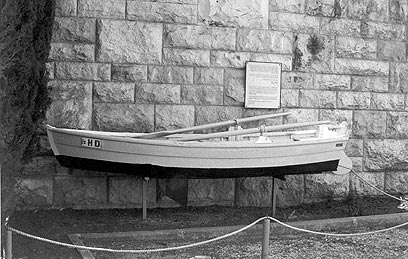The flight of more than 7,000 Danish Jews – around 95% of the total – to safety in neighboring Sweden in 1943 is an inspirational story from an otherwise dark chapter in Europe's history.
It has been said that King Christian X wore the Star of David in sympathy with Jews as he rode through the streets of Copenhagen, but that is a myth – Danish Jews never had to wear the yellow badge.
However, the grassroots campaign to help them to safety starting in the early hours of October 2, 1943, is still central to Danish self-understanding and the country's image abroad as an open and tolerant country.

Boat used to smuggle Danish Jews to Sweden (photo courtesy of Yad Vashem)
Reflecting the centrality of the event, the 70th anniversary was marked Wednesday with commemorations including a special performance at the Royal Theater attended by Queen Margrethe II.
For three years after the Nazi invasion in 1940, Denmark's coalition government was allowed to rule with a degree of independence in exchange for cooperating with the occupiers.
Denmark was allowed to hold democratic elections, for example, and the civil courts continued to function.
Well integrated in Danish society
Unlike elsewhere in occupied Europe, the Jewish community was well integrated in Danish society, and most Danes would have seen an attack on them as an attack on their fellow countrymen.
Historians have often cited that as a key factor behind the rescue of the Jews, who throughout most of the occupation were treated like any other Danes.
"The Germans, all the way up to Berlin, realized the complete rejection with which such an action (deportation) would be met," Bo Lidegaard, a historian and the editor of Danish daily Politiken, told AFP.
"That created a situation in Denmark that was very different from in other places," he added.
In his book "Countrymen", Lidegaard argues that the government succeeded in shaping public opinion by linking nationalism – "Danishness" – to tolerance, a force of good that rose above the Nazis.
However, in the past decade a slew of books and essays have chipped away at the national consensus that cooperating with Nazis was the morally right thing to do, or even necessary.
In 2003, then-prime minister Anders Fogh Rasmussen stirred controversy by saying that if everyone in Europe "had thought the same as the Danish lawmakers, then Hitler would have won the war."
At the time, his comments were dismissed as an attempt to justify Denmark's involvement in the US-led invasion of Iraq.
Among the thousands of Jews smuggled out of Denmark was the father of Bent Bluednikow, a historian who is now a journalist at the Berlingske newspaper.
In his book "My Father's Escape", published this year, he tells the dramatic story of how his father got into a rowboat with nine others to cross the narrow strait separating Denmark and Sweden, helped by a Danish fisherman. Three of the passengers died.
For decades, Benjamin Bluednikow was so thankful to Denmark and Sweden that "the scope of the tragedy never became fully comprehensible" to him and his peers, his son wrote in the book.
"I'm also deeply thankful for that rescue effort," the author told AFP.
'It resulted in huge tragedies for Jews'
However, the book is an indictment of what he disparagingly calls Denmark's "homeland historians."
"They take 'tiny Denmark' and say the policy of cooperation was necessary because it saved the Jews," he said.
"But if we look internationally... it resulted in huge tragedies for Jewish people," he added.
To support his argument, he points to agricultural exports to Nazi Germany that were possible because Denmark put up so little resistance after the invasion.
Also, because Berlin needed to keep only a limited number of troops in Denmark, the Nazis had more resources to use in European countries with larger Jewish populations.
Danish diplomats were also reluctant to help Jews in other countries so as not to undermine relations with Hitler's Germany, he said.
The key to the Jewish population's successful escape was arguably that the Nazis responsible for deporting them appear to have turned a blind eye to it.
In fact, an attaché at the German embassy even leaked the planned deportation to Danish politicians.
Historians like Lidegaard say it was clear that the Nazis knew that Danes would not tolerate the deportation of Danish Jews.
Bluednikow countered that top German Nazis were mostly interested in maintaining calm so that Danish farmers could keep feeding their troops.
And as indications grew that Germany was losing the war, some may have wanted to "save their own skin" ahead of the tribunals that followed, he said.
Lidegaard disagreed. "You have to remember that virtually everywhere else in Europe, SS officers... did the exact opposite," going ahead with mass deportations to the death camps, he said.
"The fact remains that the vast majority of Danish Jews were taken to safety in Sweden, and that happened as a result of both their own determination and an outstanding, comprehensive rescue effort in a country that lacked government and a free press," he said.
"And that is completely unparalleled in European history."















